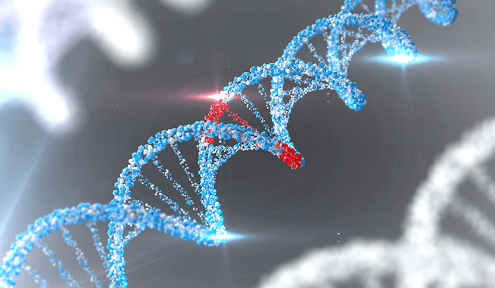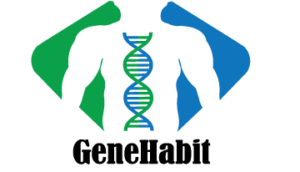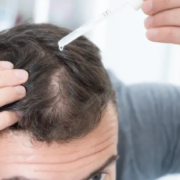Tag Archive for: Hair Care
How to Get Enough Zinc for Healthy Hair: Foods, Genes, and More!
 Zinc is a nutrient that is essential for human health. It has a variety of roles in the body, including helping to form DNA and proteins and aiding in cell division. Zinc is also important for hair health. A zinc deficiency can lead to hair loss and other disorders. Luckily, zinc can be found in a variety of foods, so it is relatively easy to ensure you are getting enough of this nutrient. Additionally, genes may play a role in how well you absorb zinc from food. A DNA test can help to identify any genetic variants that may affect zinc absorption and help mitigate the risk of hair loss with low zinc levels.
Zinc is a nutrient that is essential for human health. It has a variety of roles in the body, including helping to form DNA and proteins and aiding in cell division. Zinc is also important for hair health. A zinc deficiency can lead to hair loss and other disorders. Luckily, zinc can be found in a variety of foods, so it is relatively easy to ensure you are getting enough of this nutrient. Additionally, genes may play a role in how well you absorb zinc from food. A DNA test can help to identify any genetic variants that may affect zinc absorption and help mitigate the risk of hair loss with low zinc levels.
Role Of Zinc In Overall Health
Zinc is an essential mineral that supports the immune system and keeps your metabolism running smoothly. It’s also involved in protein synthesis, and cell division and promotes healing from wounds or cuts by binding with vital vitamins such as vitamin C to form a protective barrier against infection – all while helping you feel healthier!
What Role Does Zinc Plays In Your Hair Health?
If you’re like most people, you probably don’t think much about zinc. But this essential mineral plays a vital role in many of your body’s functions, including hair growth. Zinc is involved in the production of keratin, the protein that makes up your hair. It also helps keep your scalp healthy and free from dandruff. A lack of zinc can lead to hair loss and slow down new hair growth.
How Deficiency Of Zinc Can Impact Hair Health
A zinc deficiency can impact hair health in a number of ways. For starters, it can cause your hair to become dry and brittle. It may also lead to hair loss or thinning hair. In some cases, a zinc deficiency can even cause your hair to change colour, becoming dull or grey. If you are experiencing any of these symptoms, it’s important to see your doctor and get tested for zinc deficiency. If it is confirmed that you are deficient in zinc, your doctor may recommend taking a zinc supplement or making changes to your diet in order to increase your intake of this mineral. By doing so, you can help improve the health of your hair and prevent further damage.
How One Can Get Zinc?

Zinc is found in many foods, including meat, poultry, seafood, nuts, and legumes. If you’re not getting enough zinc from your diet, you may want to consider taking a zinc supplement. Talk to your doctor before starting any supplements.
The Most Recommended Zinc Supplement Products by health experts are:
Thorne Research Zinc Picolinate
Their zinc picolinate is no exception and provides an exceptional dose of zinc that the body can readily use. This product provides 30 mg of zinc, which does not exceed tolerable upper intake levels, and it comes in one convenient capsule.
How Do Genes Impact Zinc Absorption?

Genes play a role in zinc absorption, as they do with most nutrients. There are specific genes that code for proteins involved in transporting zinc into the cells, and others that regulate how much zinc is absorbed from the intestine. Mutations in these genes can lead to zinc deficiency, even if someone consumes enough zinc in their diet. The advancement in genetics and DNA technology has allowed scientists to reveal several genes associated with zinc absorption. One such reported vastly for low levels is the CA1 gene, which was linked to both UK populations as well Japanese individuals suffering from Androgenic Alopecia or also known as “Male Hair Loss”. The study conducted on these two groups displayed those who carried negative versions had lower serum Zinc values.
With DNA Test Mitigate Hair Fall Risk By Knowing Zinc Deficiency Risk
The DNA test can help to mitigate the risk of hair loss by detecting low zinc levels. The DNA test offered looks at an individual’s genetic profile and determines if they are more likely to experience baldness or thinning in their scalps due to insufficient amounts, with this new strategy you’ll be sure that your treatment has a much better chance for success because doctors know exactly which supplements work best based on someone’s unique makeup – meaning zero guesswork involved!
By Taking Up DNA Test You Can Mitigate These Hair Loss Conditions Before Its too late:
Zinc deficiency can lead to thinning or balding as well an increased risk from various other diseases such as Wilson’s disease, and sickle cell disease. DNA testing would be worth it!
If you like to know more about DNA tests and how vitamins-minerals are processed by our bodies for hair health visit here
Have a look at our products with consent links:
HairLife DNA test is designed to identify and understand the risk of premature hair loss, greying, thinning, and baldness due to genetic factors, nutritional deficiencies, and stress. HairLife DNA test also identifies the specific type of hair issue and helps you to get a personalized hair care solution for the same. This personalized hair care solution will be recommended to keep your hair healthy and nourished based on your genetic reports. Click here to read more about the HairLife test
GeneFit DNA Test provides a 360-degree personalized genetic insight about your lifestyle and well-being risks that include – the risk of weight gain or loss, nutritional deficiencies, food sensitivities, optimal fitness activities, sleep, and stress. Click here to read more about the GeneFit test.
NutriLife DNA test gives an insight into your micronutrient requirements based on your genetic report. Get personalized recommendations for essential nutrient intake with the NutriLife DNA test report and include the recommended food sources in your diet to maximize the health benefits. The genetic tests also identify your food allergies, food sensitivities, and taste perception which impacts your food absorption in the body. Click here to read more about the NutriLife test
Selenium for Hair Growth: The Mineral Your locks have been Waiting For!
 Selenium is a nutrient that’s needed for many important processes in the body, including metabolism and thyroid function. It can only be obtained through diet so it doesn’t have any negative health effects when taken at proper doses. Selenium is an important mineral that functions in the body to help protect against damage from free radicals and infections. Selenoproteins function as enzymes; proteins that are involved with DNA repair as well reproduction. Selenium is an important mineral for hair growth, and people have known this for years. It’s just that its role in the process was underestimated until recent studies came out confirming what we already knew: selenium helps with both the strength as well as thickness of your locks!
Selenium is a nutrient that’s needed for many important processes in the body, including metabolism and thyroid function. It can only be obtained through diet so it doesn’t have any negative health effects when taken at proper doses. Selenium is an important mineral that functions in the body to help protect against damage from free radicals and infections. Selenoproteins function as enzymes; proteins that are involved with DNA repair as well reproduction. Selenium is an important mineral for hair growth, and people have known this for years. It’s just that its role in the process was underestimated until recent studies came out confirming what we already knew: selenium helps with both the strength as well as thickness of your locks!
Role Of Selenium In Overall Health
Selenium is an important mineral that offers many health benefits. It is a powerful antioxidant that can help protect your body against oxidative stress and chronic conditions such as heart disease and cancer. Selenium can also boost your immune system, making you less susceptible to infections and illnesses. Getting enough selenium in your diet is essential for good health, so make sure to include foods that are rich in this nutrient.
What Role Does Selenium Play In Your Hair Health?
Selenium is a mineral that is important for hair health. It helps to protect the scalp and hair from damage and it also helps to keep the hair healthy and shiny. Selenium is also necessary for the production of thyroid hormones, which are important for overall health. If you are not getting enough selenium in your diet, you may experience hair loss or thinning hair.
How Deficiency Of Selenium Can Impact Hair Health
Selenium is an important mineral that our bodies need for optimum health. However, many people are not getting enough selenium in their diets, and this can lead to a number of health problems, including hair loss. When it comes to hair health, selenium plays an important role in keeping the scalp healthy and the hair follicles strong. It also helps to prevent dryness and itching of the scalp, two common problems that can lead to hair loss. Selenium deficiency has also been linked to dandruff and other scalp conditions.
If you think your hair loss is getting severe, get your selenium level tested.
How One Can Get Selenium? 
The recommended daily intake of selenium for adults is 55 micrograms. Good sources of selenium include seafood such as tuna and sardines, nuts such as Brazil nuts and cashews, and seeds such as sunflower seeds. Selenium can also be found in fortified foods such as cereal and bread. There are some people who cannot meet their selenium requirement from food alone. These people may need to take a selenium supplement. Selenium supplements are available in both pill and liquid form. You can manage your selenium levels in your food with DNA-based diet. It is important to consult a doctor before starting a selenium supplement, as too much selenium can be toxic.
Most Recommended Selenium Supplement Products by health experts are:
- Klaire Labs Seleno Met
- Pure Encapsulations Selenomethionine
- NOW Foods Selenium (yeast-free)
- Bluebonnet Selenium
- NOW Foods EpiCor Plus Immunity
How Genes Impact Selenium Absorption? 
Scientists have found that several genes play a role in the metabolism of selenium, which is an important mineral for many bodily functions. Genes that are involved in selenium metabolism include those that encode enzymes needed for selenium uptake, transport, and storage. Mutations in these genes can lead to abnormalities in selenium levels and potentially to health problems. Therefore, it is important to understand the role of genes in selenium metabolism in order to maintain health and prevent disease.
A study conducted on US adults displayed that individuals carrying a negative version of the GPX1 gene showed low selenium absorption and had severe hair loss issues along with thyroid dysfunction. When these individuals included selenium intake in their diet for 4 months trial their hair loss process slowed down significantly.
With DNA Test Mitigate Hair Fall Risk By Knowing Selenium Deficiency Risk
The DNA test can help to stop hair loss by determining if you have low selenium levels. The new strategy looks at an individual’s genetic profile and determines whether they are more likely to experience baldness or thinning in their scalps due to selenium or any other nutritional deficiencies, with this information doctors know exactly which supplements work best for them – meaning zero guesswork involved!
By Taking Up DNA Test You Can Mitigate These Hair Loss Conditions Before Its too late:
- Androgenic Alopecia
- Alopecia Areata
- Frontal Fibrosing Alopecia
- Telogen Eluvium
Selenium deficiency can lead to thinning or balding as well an increased risk of various other diseases such like thyroid dysfunction, mental retardation, and fatigue. DNA testing would be worth it!
If you like to know more about DNA tests and how vitamins-minerals are processed by our bodies for hair health visit here
DNA- Based Hair Loss And Hair Care Solutions With HairLife
Genetic testing for Hair loss reveals the risks for an individual for their hair loss, hair thinning, or premature greying. Genetic testing also identifies the cause of premature hair loss, greying, thinning, or baldness due to genetic factors, nutritional deficiencies, and stress.
Have a look at our products with consent links:
HairLife DNA test helps you to identify and understand the risk of premature hair loss, greying, thinning, and baldness due to genetic factors, nutritional deficiencies, and stress. HairLife DNA test also pinpoints the specific type of hair issue and helps you to get a personalized hair care solution for the same. This personalized hair care solution will be designed to keep your hair healthy and nourished. Your personalized DNA report provides recommendations for hairstyles, nutrition recommended supplements, and hair care products. Click here to read more about the HairLife test
GeneFit DNA Test provides a 360-degree personalized genetic insight about your lifestyle and well-being risks that include – the risk of weight gain or loss, nutritional deficiencies, food sensitivities, optimal fitness activities, sleep, and stress. Click here to read more about the GeneFit test.
NutriLife DNA test gives an insight into your micronutrient requirements based on your genetic report. Get personalized recommendations for essential nutrient intake with the NutriLife DNA test report and include the recommended food sources in your diet to maximize the health benefits. The genetic tests also identifies your food allergies, food sensitivities, and taste perception which impacts your food absorption in the body. Click here to read more about the NutriLife test
Iron and Hair Health: The Vital Mineral Your Hair Needs
 Iron is an essential mineral for human health, playing a role in many different bodily functions. One of the most well-known roles of iron is its importance in the formation of red blood cells. However, iron also plays a critical role in hair health. Iron is essential for life. It’s used in many processes including oxygen transport and production of hormones, but most importantly it helps your body grow! Iron is a vital mineral for the health and beauty of your hair, but it often gets neglected. If you’re losing hairs then get checked to see if there’s an issue with iron levels in that area!
Iron is an essential mineral for human health, playing a role in many different bodily functions. One of the most well-known roles of iron is its importance in the formation of red blood cells. However, iron also plays a critical role in hair health. Iron is essential for life. It’s used in many processes including oxygen transport and production of hormones, but most importantly it helps your body grow! Iron is a vital mineral for the health and beauty of your hair, but it often gets neglected. If you’re losing hairs then get checked to see if there’s an issue with iron levels in that area!
Why Is Iron Important For Our Body?
Iron is important for our body because it helps us produce red blood cells. These cells are responsible for carrying oxygen throughout our bodies, and without enough iron, we can become anaemic. Symptoms of anaemia can include fatigue, shortness of breath, dizziness, and pale skin.
While there are many different types of anaemia, the most common is iron-deficiency anaemia. This type of anaemia can be caused by a number of factors, including a poor diet, blood loss, or pregnancy. Iron-deficiency anaemia can be treated by taking iron supplements and making sure to get enough iron in your diet.
Role Of Iron In Hair Health
In order for hair to grow and remain healthy, it needs a sufficient amount of iron. A lack of iron can lead to hair loss and a decrease in hair quality. This is because iron is necessary for the production of haemoglobin, which transports oxygen from the lungs to the rest of the body. Haemoglobin is also responsible for supplying nutrients to the scalp and hair follicles.
How Deficiency Of Iron Can Impact Hair Health
Iron is an important mineral for hair health. It helps to transport oxygen to the cells and tissues, including the hair follicles. Without enough iron, the hair follicles may become starved of oxygen, leading to weaker, thinner hair. An iron deficiency can also lead to hair loss.
If you think you may be deficient in iron, it’s important to see your doctor for a blood test. Treatment for iron deficiency usually involves taking iron supplements. Getting more iron-rich foods in your diet can also help improve your overall health and well-being.
How Can One Get Iron? 
Fortunately, there are many different ways to get the recommended amount of iron each day. You can eat foods that are high in iron, such as red meat, dark leafy greens, beans, and fortified cereals. You can also take iron supplements in the form of pills or injections.
Most Recommended Iron Supplement Products by health experts are:
- Best overall iron supplement: Thorne Iron Bisglycinate.
- Best affordable iron supplement: Nature Made Iron 65mg Tablets.
- Best iron supplement with vitamin C: Pure Encapsulations OptiFerin-C.
- Best vegan iron supplement with vitamin C: Garden of Life Vitamin Code Raw Iron.
If you are concerned about your hair health, or if you have noticed a decrease in hair quality or excessive hair loss, talk to your doctor about getting a blood test to check your iron levels. If your iron levels are low, there are hair loss genetic treatment options available that can help improve your hair health.
How Do Genes Impact Iron Absorption?
There are a number of factors that influence how well your body absorbs iron. One of these is your genes. Some individuals are simply better at absorbing iron than others. However, there are also genetic tests that can be performed to determine whether you have a genetic mutation that affects your ability to absorb iron. If you do have this mutation, there are supplements available that can help increase your iron levels.
The advances in genetics and DNA sequencing technology have enabled scientists to report several problems associated with low iron absorption. In a recent study conducted on Hispanics, US adults displayed that individuals suffering from alopecia or telogen conditions had significantly lower levels of iron when compared to healthy control group showing slower hair loss frequencies as per standard daily intake recommendations.
Another important factor that affects iron absorption is the presence of other minerals in the body. For example, zinc and copper play a role in the absorption of iron, so if you are deficient in either of these minerals, your body will be less able to absorb the iron from food sources.
Image- https://www.canva.com/photos/MADmTOqsi3Q–genetic-engineering/
With DNA Test Mitigate Hair Fall Risk By Knowing Iron Deficiency Risk
DNA tests can help to mitigate the risk of hair loss by detecting low iron levels. The test looks at an individual’s genetic profile and can determine if they are more likely to experience hair loss if they have low iron levels. With this new strategy, you can be sure that your hair loss treatment will have a much better chance of success. Doctors and experts know exactly which supplements are best for each individual this means zero guesswork and zero harmful side effects.
By Taking Up DNA Test You Can Mitigate These Hair Loss Conditions Before Its too late:
- Androgenic Alopecia
- Alopecia Areata
- Frontal Fibrosing Alopecia
- Telogen Eluvium
The lack of iron can lead to thinning or balding as well an increased risk of various other diseases such like low haemoglobin, fatigue and immunity problems. Getting tested for DNA would be worth it!
If you like to know more about DNA tests and how vitamins-minerals are processed by our bodies for hair health visit here
DNA- Based Hair Loss And Hair Care Solutions With HairLife
With Genetic testing for Hair loss, one can understand and know their risk for hair loss, hair thinning, or premature greying. Genetic testing also identifies the cause of premature hair loss, greying, thinning, or baldness due to genetic factors, nutritional deficiencies, and stress.
Have a look at our products with consent links:
HairLife DNA test helps you to identify the risk of premature hair loss, greying, thinning and baldness due to genetic factors, nutritional deficiencies and stress. HairLife DNA test also reveals the specific type of hair issues and a personalized hair care solution suitable for you to keep your hair healthy and nourished. Your personalised DNA report provides recommendations for hairstyles, nutrition recommended supplements, and hair care products. Click here to read more about the HairLife test
GeneFit DNA Test provides a 360 degree personalized genetic insight about your lifestyle and well-being risks that include – the risk of weight gain or loss, nutritional deficiencies, food sensitivities, optimal fitness activities, sleep, and stress. Click here to read more about GeneFit test.
NutriLife
NutriLife DNA test gives an insight into your nutritional requirements of vitamins and minerals based on your genetic profile. Get personalised recommendations for essential nutrient intake with NutriLife DNA test report and include the recommended food sources in your diet. Your food allergies or sensitivities along with taste perception are also identified in the genetic testing to maximize health benefits. Click here to read more about NutriLife test
12 Tricks to Avoid Premature Hair Loss And Hair Thinning
There could be many causes of hair loss that including diet, mineral deficiency, medications, stress, pollution, and genetics.
Here are a few tips to avoid or slow down hair loss:
- DNA-based diet: A study found that a diet containing raw vegetables and fresh herbs, like the Mediterranean diet, may reduce or slow the onset of androgenic alopecia.
- DNA-based personalized nutrition: Multivitamin supplements are a great way to ensure that you’re getting the recommended daily intake of vitamins in a single dose. Vitamins are not only healthy for overall wellbeing but also good for your hair. Vitamin A encourages healthy production of sebum in the scalp, vitamin E betters blood circulation in the scalp to help hair follicles remain productive, and vitamin B helps hair maintain its healthy color.
- Hair Care & Management Based on Genetic Testing: Regular hair washing may protect against hair loss by keeping the scalp healthy and clean.
- Hair Style: To avoid excessive hair shedding, avoid tight braids or ponytails that may pull on the root. Avoid brushing wet hair.
- Hair Loss Management: Be sure that you have time to let your hair air dry before brushing it. Brushing wet hair can lead to hair loss.
- Massage: The benefits of scalp massage are – increased blood flow and nourishment of hair follicles. The more blood flow you have, the more nourishment to the follicle.
- Yoga: Yoga may help people who suffer from stress-induced hair loss.
- Regularly wash your hair with mild shampoo: Regular hair washing is a part of preventing hair loss by keeping the hair and scalp clean.
- Enrich diet with protein: Eating lean meats, fish, soy, or other proteins promotes hair health and it helps to curb hair loss.
- Scalp massage with essential oils: Those who have been experiencing hair loss for quite some time must massage the scalp with essential oil for a couple of minutes. It helps your hair follicles remain active. You can add lavender in an almond or sesame oil.
- Avoid brushing wet hair: When hair is wet, it is in its weakest state. So avoid brushing wet hair because the chance of hair loss increases. But if you want to comb wet hair, use a very wide-toothed comb. Also, avoid brushing hair too frequently as doing so can injure hair and increase loss. Use your fingers to undo tangles, not a comb or brush.
- Take a Genetic Test To Avoid Premature Hair Loss & Hair Thinning: A DNA test looks into details of genes and their variations that could cause premature hair fall or thinness. A DNA describes your risk of baldness or pattern hair loss and recommendations about nutrition, supplements, and treatments that can help avoid or slow down your hair loss.
You can get genetic testing for hair loss and personalized hair care management to let you know about the genetic risks for hair loss and for personalized DNA-based haircare. For more details, visit our product – HairLife
HairLife- DNA Analysis & Testing for Hair loss & Hair Care Management
Genehabit’s Hairlife DNA Analysis for Hair loss & Hair Care Management gives a detailed insight about your genetics and a personalized genetic report about hair problem inheritance like baldness gene, hair loss, hair thinning, androgenic and alopecia, etc. Click here to read more about Hairlife Test or connect to our expert
Take a look at GeneHabit, Singapore products designed for personalized solutions based on your genetic testing by
- HairLife – HairLife DNA test in Singapore primarily focuses on identifying your inheritable risk of premature hair loss, greying, and thinning due to genetic factors, nutritional deficiencies, and stress. It also helps to identify your hair type and suitable DNA-based hair care solutions to keep your hair healthy and nourished. With your personalized DNA reports our expert team would provide recommendations for hairstyles, nutrition, supplements, and hair care products. Click here to read more about HairLIFE DNA Test
- NutriFit – NutriFit DNA test in Singapore discovers your micronutrient requirements with the help of your genetic report. NutriFit DNA test report provides personalized recommendations for nutrient intake according to your diet and lifestyle. With this personalized report, you can identify your food sensitivities or allergies along with taste perception to enhance your health benefits. Click here to read more about the NutriFit test
- FitLife– FitLife DNA test in Singapore gives insights regarding your fitness attributes – the suitable type of exercise, aerobic capacity, and injury risk for you to achieve desired fitness level. Get your genetic report today to transform your workouts and to achieve the desired fitness result. Click here to read more about the FitLife test
6 Reasons You’re Not Losing Weight – Understand Genetics, Diet, & Lifestyle
It’s all about understanding your Genetics, Diet, and Lifestyle!!
Are you unsatisfied with your body weight or unable to shred weight even after eating healthy and working out? It’s time to understand your body metabolism and genetics as both play a major role in regulating our body weight.
Here are 6 possible reasons that might be hindering your weight loss:
- Your genes may be the reason for your slow weight loss.Studies suggest that your genes contribute to 40-70% of obesity; scientists have found more than 50 genes that are strongly associated with obesity or fat deposition. An individual with variants of these genes is at high genetic risk of obesity or access to weight gain.It’s good to get your genetic testing done to detect any obesity risk or fat-causing genes. This will help you to customize your diet and exercise to lead a healthy life.
- You’re following a diet that doesn’t meet your body or genetic makeupOften diet plans are a bit of a hit and trial to see which diet helps to reduce weight. One size fits all approach does not help your weight loss goals as each individual has a unique genetic profile. Gene variations determine the optimal type of diet for an individual. Some individuals would benefit from a high protein diet, some with low carbs and fats while others from a diet rich in healthy fats.You may not be aware but your taste preferences directly impact weight as it affects your like or dislike towards a particular food type. For example, people with strong sweet taste preferences consume more sweet stuff or desserts; this can cause weight gain and other metabolic disorders.As per studies your genes directly impact your taste buds so it’s good to know about your taste perception with GeneHabit DNA test to avoid obesity risk.Similarly, genes also regulate your food sensitivities at a large scale as proven in recent studies. People with lactose intolerance suffer bloating and other gut issues.

- Are you working out in the right way?Have you noticed that some people’s body responds to the exercise and workout plan effortlessly, while others try so hard for months at the gym and do not see any results?Your sedentary lifestyle is one of the major hurdles for your inability to lose weight, especially during this pandemic. Apart from lifestyle your genes also affect your sedentary behavior or exercise aversion that leads you to obesity.People with certain genes lose more weight to a specific type of exercise. You might not be doing the right exercise that is optimal for weight loss.For example; some people lose more weight with endurance exercise whereas some other individuals can shred his/her weight with aerobic exercise. We will help you to understand what exercise type would suit you depending upon your genes for weight loss.
This bowls down to fact that the genetic risk of obesity can be mitigated by leading a healthier lifestyle. Research shows that regular exercise, healthy eating, and certain lifestyle changes can deactivate the genes that make you put on weight.

- You may not be meeting your essential nutrient requirements.Essential nutrients play key roles in our body’s metabolism. If you aren’t getting all your vitamins and minerals, a slow metabolism will also contribute to progressive unwanted weight gain.Your genes play a major role in influencing macronutrient deficiencies as discovered in the latest studies. For example; Vitamin C deficiency is regulated by a genetic change in the BCMO1 gene under which your body is unable to covert Vitamin C into a usable form. Thus slowing down fat metabolism leading to obesityKeep your nutrient deficiencies in check with the GeneHabit DNA test and personalized recommendations.

- You’ve hit a weight loss plateauPeople with a strong genetic predisposition to obesity may not be able to lose weight with the usual forms of diet and exercise therapy. Hence you need to keep a track of your diet and exercise to break this weight plateau.Performing exercise, especially strength training, can help offset the drop in metabolic rate that occurs during weight loss. Endurance, Power, Strength, or Moderate exercise suits you.Tracking your calorie and macronutrient intakes can provide accountability and help in breaking the weight plateau.The increased cortisol production that’s associated with stress can interfere with weight loss. Stress-reduction strategies may help promote weight loss.
- Keep a check on your sleep durationSleeping for more than 9 hours and less than 7 hours can impact your food cravings and midnight snacking at odd hours leads you to risk of obesity and makes it difficult for you to lose weight.Researchers have identified specific genes that trigger the development of sleep problems, disturbed circadian rhythms and have also demonstrated a genetic link between insomnia and weight gain.Your caffeine intake also influences your sleep. Your genes play a major role in caffeine metabolism. So if you are a slow metabolizer intake of caffeine post evening impacts your sleep which directly impacts your weight.
- Your mental health and working environment impact your weight directly!We all live in high-stress situations. You may not know or observe but stress affects your body weight by leading you into stress eating, binge eating, and eating comfort food habits. Thus it makes a herculean task for you to lose weight.Stress is not only a lifestyle-related factor but our genes also play a prominent role in how we react to stressful events in life. You must have seen few people cope with work pressure easily where other individuals crumble down emotionally this is decided by the action of your neural genes.Stress is not avoidable but manageable with GeneHabit DNA test and a healthy lifestyle.

How Genetic testing can determine the genetic risk of obesity or weight issues?
Understanding your genetic profile and susceptibility to weight gain can provide long-term health benefits.
GeneHabit enables you to influence your BMI and blood lipids by regulating your dietary intake and your physical activity.
We will encourage you to manage your diet and increase your exercise to control your weight.
At Genehabit we have developed a personalized genetic test to let you know about your genetic obesity risk with personalized recommendations for more details visit our products,
- GeneFit – GeneFit provides a 360 degree personalized genetic insight about your lifestyle and fitness risks that include – the risk of extreme weight gain or loss, nutritional deficiencies, food sensitivities, optimal physical activities, sleep, and stress. Click here to read more about the GeneFit test.
- NutriLife – NutriLife DNA test identifies your nutritional requirements of vitamins and minerals based on your genetic profile. NutriLife DNA test report provides personalized recommendations for nutrient intake by including recommended food sources in your diet. Your food allergies or sensitivities along with taste perception are also identified to maximize health benefits. Click here to read more about NutriLife test.
- FitLife – FitLife DNA test identifies your fitness attributes – the optimal type of exercise, aerobic capacity, and injury risk for you to achieve desired fitness level. Discover genetic insights in your DNA that can transform your choice of workouts and training for optimal fitness. Click here to read more about the FitLife test.
- HairLife – HairLife DNA test identifies your risk of premature hair loss, greying, and thinning due to genetic factors, nutritional deficiencies, and stress. HairLife DNA test identifies the specific type of hair issues that you are suitable for and recommends preventive action to keep your hair healthy and nourished. Your personalized DNA report provides recommendations for hairstyles, nutrition recommended supplements, and hair care products. Click here to read more about the HairLife test.
- SkinLife – SkinLife DNA test provides comprehensive, personalized genetic insights into your skin type and your risk of premature aging, sun damage, allergies, and more. Click here to read more about SkinLife test.
For your queries and questions visit our FAQ section, or contact our experts for personalized plans and recommendations.
Genetic Testing: Your Companion for Your Healthy Future
Genetic testing what is all about?
Genetic testing is a type of test that identifies changes in genes, chromosomes. With the advancement of DNA sequencing technologies, this has become a cutting-edge technique to detect several metabolic disorders.
Hey but first let’s understand what DNA and genes do in your body:

DNA: DNA is the building block of life and is a double-helix molecule. In your body, DNA is tightly coiled up into chromosomes. Chromosomes contain genes, which are the blueprint for all living things.
DNA is the code for our entire human genome. It is made up of four chemical bases: adenine (A), guanine (G), cytosine (C), and thymine (T). The average human has 3 billion bases and 99% are the same.
What does DNA do?
DNA contains the instructions needed for an organism to develop, survive and reproduce. To carry out these functions, DNA sequences must be converted into messages that can be used to produce proteins, which are the complex molecules that do most of the work in our bodies.
DNA contains the instructions to make a living being. To survive and reproduce, DNA needs to be converted into messages that can be used to produce proteins, which are complex molecules that do most of the work in our body.
Next, information in the mRNA molecule is translated into amino acid sequences. This language tells the cell’s protein-making machinery how to link amino acids in a specific order to produce the protein.
Genes: A gene is a piece of DNA that tells the body how to make a protein. A gene is often between 1000 and 1 million base pairs long, but they can be significantly smaller or much larger, and they usually make up only about 1% of the DNA sequence. The rest of the DNA sequence is about regulating when, how, and how much of a protein is made.
Every person has two copies of each gene, one from their mother and one from their father. Most genes are the same in everyone, but only a few genes (less than 1 percent of the total) are different. These small differences create your unique physical features.
What is the function of a Gene?
Genes decide almost everything about a living being. One or more genes can affect a specific trait. Genes may interact with an individual’s environment too and change what the gene makes.
Genes affect hundreds of internal and external factors, such as whether a person will get a particular color of eyes or what diseases they may develop.
Gene variation is generally termed as SNP (Single Nucleotide Polymorphism)
What are gene variations or SNP?

SNP is a DNA sequence variation that occurs when a single nucleotide (Adenine [A], Thymine [T], Cytosine [C], or Guanine [G]) in the DNA sequence is altered and the particular alteration is present in at least 1% of the population.
Why SNPs are important?
Multiple research studies have identified SNPs across our genes that are responsible to cause metabolic like body weight, food intolerance, stress, and susceptibility to environmental factors such as toxins. SNPs can also be used to track the inheritance of disease genes within families and ethnicities. The presence of such SNPs can help to determine the risk of developing a metabolic conditioner disorder. Once the associated risk with an SNP or set of SNPs linked to a condition is identified mitigation or intervention could be applied to reverse the effect of variations.
These SNPs are tracked down with the help of genetic testing. It helps to detect problems causing gene variations.
Genetic testing and how it works?
Genetic testing is a type performed in a modern laboratory to identify changes in your DNA or genes. Genetic test results can confirm or rule out suspected genetic variations to determine a person’s risk of developing a health issue or disorder. More than 80k genetic tests are currently in use, and others are being developed.
Genetic testing involves looking for changes in:
Genes: Genetic testing is a way of looking for changes in DNA. It can be done on a small scale (analyzing a single nucleotide) or on a broader scale (studying an entire genome). Analysis can involve identifying variations in genes that can cause or increase the risk of a genetic disease or disorder.
Chromosomes: Chromosomal genetic tests analyze the length of DNA to look for genetic changes that can cause a condition. These genetic changes can include an extra copy of a chromosome, which can result in a genetic condition.
Proteins: Biochemical genetic tests look at proteins or enzymes to check for any abnormalities that may indicate a change in DNA. This can result in genetic disorders.
Know how it’s done?
Genetic tests are performed on hair, skin, amniotic fluid, blood, or other tissues. These tests are usually done by collecting cells from the inside of your cheek with a small brush or cotton swab. These samples are then sent to a laboratory where technicians compare them with a database of known genetic variant
A laboratory will produce a detailed report about the test results and send it to the client or their doctor or genetic counselor.
Why do genetic testing? How can genetic testing help?
Genetically testing your genes can have benefits, no matter what the result might be. This kind of testing can provide relief from uncertainty and allow people to make informed decisions about their health care. For example, a negative result might eliminate the need to undergo unnecessary check-ups or screenings in some cases.
It boils down to the fact that genes play a vital role in our well-being. A DNA test can help determine our risk for various conditions, such as obesity, early wrinkling, sensitivity to UV light or chemical sensitivities.
Applications of Genetic Testing for Well-being
DNA testing can help in many spears of day-to-day life and provides valuable insights to manage nutrition, weight, fitness, skincare, haircare, mental health, and diseases. DNA testing provides great insights about your genetic risk towards specific conditions that can help provide personalized care and lifestyle changes for better lifestyle management.
Here are some of the key lifestyle DNA tests that one can use to improve well-being:
- DNA Analysis & Testing for Weight Management & Weight Loss
We all know that diets don’t work on some individuals, but why? It’s because of our DNA. Much of our success in losing weight and staying healthy is based on genetics, and not just the food we eat. DNA testing can help you understand your diet and exercise. DNA testing for weight loss makes it possible to choose a diet plan that will have the greatest benefit for each person.
- DNA Analysis & Testing for Nutritional Balance & Diet Plan
Genetic predisposition and environment can both influence your susceptibility to allergies. Genetic testing helps to filter out what food suits you best and is gut-friendly. Gene testing also helps you to discover your major nutrient deficiency risk this helps you to customize your diet with precision for your optimal fitness.
- DNA Analysis & Testing for Skin Care & Skin Problems Management
DNA Skin test provides comprehensive, personalized genetic insights into your skin type and your risk of premature aging, sun damage, allergies, and more. This helps you to understand what product dietary nutrition suits your ever-growing skin.
- DNA Analysis & Testing for Hair Care & Hair Loss Management
Gene testing for Hair loss helps any individual who would like to understand their risk of hair loss, thinning, or premature greying. DNA test identifies your risk of premature hair loss, greying, and thinning due to genetic factors, nutritional deficiencies, and stress.
Have a look at our products with consent links:
- GeneFit – GeneFit provides a 360 degree personalized genetic insight about your lifestyle and fitness risks that include – the risk of extreme weight gain or loss, nutritional deficiencies, food sensitivities, optimal physical activities, sleep, and stress. Click here to read more about GeneFit test.
- NutriLife – NutriLife DNA test identifies your nutritional requirements of vitamins and minerals based on your genetic profile. NutriLife DNA test report provides personalized recommendations for nutrient intake by including recommended food sources in your diet. Your food allergies or sensitivities along with taste perception are also identified to maximize health benefits. Click here to read more about NutriLife test.
- FitLife – FitLife DNA test identifies your fitness attributes – the optimal type of exercise, aerobic capacity, and injury risk for you to achieve desired fitness level. Discover genetic insights in your DNA that can transform your choice of workouts and training for optimal fitness. Click here to read more about the FitLife test.
- HairLife – HairLife DNA test identifies your risk of premature hair loss, greying and thinning due to genetic factors, nutritional deficiencies and stress. HairLife DNA test identifies the specific type of hair issues that you are suitable for and recommends preventive action to keep your hair healthy and nourished. Your personalized DNA report provides recommendations for hairstyles, nutrition recommended supplements, and hair care products. Click here to read more about the HairLife test.
- SkinLife – SkinLife DNA test provides comprehensive, personalized genetic insights into your skin type and your risk of premature aging, sun damage, allergies and more. Click here to read more about SkinLife test.
For you queries and questions visit our FAQ section, or contact our experts for personalized plans and recommendations.











